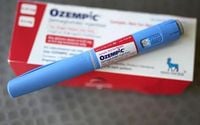Novo Nordisk, the Danish pharmaceutical giant renowned for its groundbreaking weight-loss drug Wegovy, has revised its revenue and profit forecasts for the first time since the drug's launch four years ago. The company attributes this change to the rising prevalence of unauthorized compounded versions of its GLP-1 medications, particularly affecting sales in the United States, its largest market.
As a result, Novo Nordisk now anticipates a sales growth of between 13% and 21% in constant currencies for the year, a notable decrease from its previous forecast of 16% to 24%. Operating profit is also expected to be lower, with projections now set at 16% to 24%, down from the earlier estimate of 19% to 27%. "We have reduced our full-year outlook due to lower-than-planned branded GLP-1 penetration, which is impacted by the rapid expansion of compounding in the US," stated Lars Fruergaard Jorgensen, CEO of Novo Nordisk.
The situation stems from a decision by the U.S. Food and Drug Administration (FDA), which had permitted pharmacies to create their own compounded versions of semaglutide—the active ingredient in both Wegovy and Ozempic—to address temporary supply shortages. However, with supply chains stabilizing, the FDA has mandated that these compounded versions be removed from the market by May 22, 2025. This regulatory action has led to a surge in Novo's stock, which jumped 6.8% in Copenhagen following the announcement, despite the lowered revenue forecasts.
Wegovy sales have surged an impressive 83% year-on-year, reaching $2.65 billion. However, this growth fell short of analyst expectations and marked a decline from the previous quarter. Meanwhile, Ozempic experienced a 15% increase, slightly exceeding forecasts. Novo estimates that compounding pharmacies have captured nearly one-third of the U.S. obesity drug market, presenting a significant challenge to its dominance in the rapidly expanding GLP-1 sector.
Jorgensen expressed concern about the unprecedented situation, remarking, "It’s unprecedented in our industry to have very large volumes of products flowing to patients that are not approved." Investor anxiety has intensified as competition heats up, particularly from U.S. rival Eli Lilly, which has made significant strides with its drug tirzepatide, branded as Mounjaro for diabetes and Zepbound for obesity. Recently, Lilly released promising trial data for a new weight-loss pill, raising concerns about Novo's market share in the injectable GLP-1 segment.
In response to these challenges, Novo Nordisk has made aggressive investments, including a substantial $11 billion acquisition of three factories from Catalent, a U.S.-based contract manufacturer, aimed at ramping up Wegovy production. Jorgensen also addressed rising concerns over potential pharmaceutical tariffs from the Trump administration, emphasizing that Novo is a net exporter from the U.S. and operates multiple production sites there, employing over 10,000 people. "We have a strong U.S. footprint," he noted, highlighting that most of the company’s GLP-1 products are manufactured in the U.S. and shipped globally.
Despite the challenges, Novo Nordisk's GLP-1 franchise remains the market leader. However, the era of uninterrupted growth may be coming to an end as price pressures, regulatory changes, and fierce competition disrupt the sector. Investors are now keenly observing how Novo navigates its U.S. supply dynamics, defends its market share against new entrants, and transitions to the next phase of its product innovation pipeline, which may include potential oral therapies.
In a related development, David Moore, executive vice president of U.S. operations at Novo Nordisk, confirmed the company's anticipation of the FDA's ban on compounded copies of its drugs, including Wegovy and Ozempic. "The enforcement is scheduled to commence on May 22, 2025," he stated during an analyst call following the release of the company's first-quarter results. Moore also emphasized that the company would continue its efforts to combat illicit compounding.
The impending ban is part of the FDA's broader initiative to regulate the pharmaceutical industry and protect consumers from potentially harmful or ineffective drugs. Although the specifics of the ban's impact were not detailed by Moore, it represents a significant regulatory shift that could reshape the landscape for GLP-1 drugs in the U.S.
As Novo Nordisk grapples with these challenges, the focus remains on how the company will adapt to a changing market environment while continuing to innovate and maintain its leadership position in the obesity and diabetes treatment sectors. With rising competition and shifting regulatory dynamics, the coming months will be critical for the company as it seeks to reclaim its dominance in the GLP-1 market.

